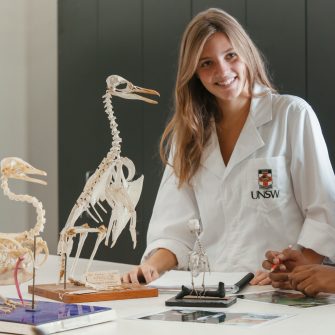Bachelor of Medicinal Chemistry (Honours)
- Commencing Terms
- Term 1, 2 & 3
- Duration
- 4 Year(s)
- Delivery Mode
- Face-to-face (includes blended)
- Campus
-
Kensington
- Codes
- UAC code 429720
- Program code 3999
-
2025 Indicative first year full fee
- $8,500*
-
2025 Indicative full fee to complete degree
- $39,000*
-
2025 Indicative first year full fee
- $57,000*
-
2025 Indicative full fee to complete degree
- $253,500*

- Overview
- Entry requirements
- What will I study?
- Future careers
- How to apply
- Fees & Scholarships
Overview
The Bachelor of Medicinal Chemistry (Honours) at UNSW combines the cutting-edge fields of biology, biochemistry, pharmacology and essential chemistry. This interdisciplinary program is your gateway to the rapidly growing world of new drug design and development, covering every stage from concept to clinic.
Jointly offered by UNSW's top-ranked Schools of Chemistry, Biotechnology & Biomolecular Sciences, and the Pharmacology section of the School of Biomedical Sciences, this degree equips you with the specialised skills to design and synthesise novel drug candidates, understand their biochemical effects and navigate the rigorous testing, regulatory and ethical processes involved in modern pharmaceuticals.
In your Honours year, you’ll undertake a research project supervised by leading scientists, gaining hands-on experience in real-world drug development. Gain a rare blend of expertise in chemistry, pharmacology and molecular biology, and graduate with ample job opportunities to explore within global pharmaceutical companies, biotech firms and research institutes.
Key features
Lead an independent research project
In your final year, you’ll undertake a supervised research project, giving you the opportunity to contribute to original research in your field. You’ll have the opportunity to work alongside researchers to explore new solutions in drug development, preparing you for postgraduate study or immediate entry into the workforce.
Interdisciplinary learning with real-world impact
This program integrates essential chemistry with contemporary biology, biochemistry and pharmacology, giving you a truly interdisciplinary education. You’ll develop a deep understanding of the drug development process, preparing you for careers in both pharmaceuticals and broader science industries.
Kick off your career with a valuable accreditation
Upon graduation, you’ll receive a formal accreditation from the Royal Australian Chemistry Institute, opens in a new window. This represents the highest standards of education and professional practice, making you a standout candidate for employers.
Why study this degree at UNSW?
Learn from leading educators in cutting-edge facilities
UNSW is ranked #2 in Australia and in the global top 50 for chemistry (QS World University Rankings by Subject, 2025). Study in UNSW's state-of-the-art laboratories and gain hands-on experience using the latest technology in chemistry and pharmacology. You’ll be taught and mentored by internationally recognised academics and researchers who have specialist expertise in medicinal chemistry and drug development.
Real-world industry connections
Benefit from UNSW’s strong partnerships with industry, including pharmaceutical companies, biotech firms and research institutes. These connections offer you networking opportunities, industry placements and guest lectures that prepare you for a successful career.
Vibrant student community
At UNSW, you’ll be part of an active and supportive student community. Join one of the 16 Science-focused societies on campus and have the opportunity to attend events, guest lectures and networking events.
Want to see more from UNSW Science?
Entry requirements
Assumed knowledge
Chemistry, Mathematics Advanced
Adjustment Factors
We offer a range of adjustment factor schemes that reward students for academic performance and extra-curricular achievements. These schemes also take into account a range of personal and educational disadvantages that may have affected your studies.
HSC Plus
This scheme rewards students who perform well in Year 12 subjects that are relevant to their preferred UNSW degree. You may be awarded up to five points.
Elite Athletes, Performers and Leaders (EAPL)
This program recognises achievements in the areas of sport, academia, leadership and music at an elite level. You may be eligible for up to five points.
Educational Access Scheme (EAS), opens in a new window
Factors such as illness, financial hardship, language difficulties or attending a particular school can mean you don't always get the best possible marks in Years 11 and 12. If one of these situations applies to you, submit an application for the Educational Access Scheme (EAS) via UAC. Eligible students can receive between 1 and 10 points towards their chosen UNSW degree.
Admission pathways
Your ATAR is not the only measure of your potential to succeed, which is why we offer a range of pathways into university. Explore your options below and get in touch with our Future Student Advisers to discuss your path to UNSW.
Gateway Admission Pathway
This scheme is open to students who attend Gateway schools, live in a low-socioeconomic area based on IRSAD and IEO indexes of SEIFA criteria, or are an Aboriginal and Torres Strait Islander person. It adjusts the ATAR requirements for your preferred UNSW degree and provides early offers and early conditional offers to UNSW.
Entry programs for Australian Aboriginal and Torres Strait Islander people
We offer entry programs for Indigenous Australians, including the Indigenous Preparatory Programs and the Indigenous Admission Scheme (IAS). The entry pathway program you apply for will depend on the degree you want to study.
English language requirements
You may be asked to provide evidence of your English proficiency to study at UNSW depending on your educational background and citizenship. English language skills are vitally important for coping with lectures, tutorials, assignments and examinations - this is why UNSW requires a minimum English language competency for enrolment.
If you’re completing an Australian Year 12 qualification (e.g. NSW HSC or equivalent), you do not need to provide anything extra to prove your proficiency. Your qualification will be used as evidence of your English proficiency.
If you do need to provide evidence of your English proficiency, this will be indicated in your application. You can prove this by providing evidence that you meet one or more of the following criteria:
- English language tests and university English courses
- Prior study in the medium of English
- Other qualifications
If you need to improve your English skills before you start your degree, UNSW College’s Academic English Programs are for you. The programs are suitable for various English levels and help you prepare for university studies and life in Australia.
For more details, visit the English Language Requirements page.
International direct entry
| Qualifications | Direct entry requirement |
|---|---|
|
International ATAR
|
82.0
|
| UNSW Foundation Studies GPA |
7.4
|
|
Great Britain General Certificate of Education (GCE A levels)
|
10.0
|
|
International Baccalaureate Diploma (IB)
|
30.0
|
|
Scholastic Aptitude Test (SAT) (after 2016)
|
1180.0
|
We do not accept secondary qualifications from this country. We may accept tertiary study results, please contact us for more information.
Please contact us for direct entry requirements.
Admission pathways
If you do not meet the requirements for direct entry into your chosen degree, you may be eligible for a pathway program with UNSW College. UNSW College provides alternative entry options using university-approved content so that you can start your UNSW journey with confidence.
English language requirements
You may be asked to provide evidence of your English proficiency to study at UNSW depending on whether you are from an English-speaking background or non-English speaking background. English language skills are vitally important for coping with lectures, tutorials, assignments and examinations - this is why UNSW requires a minimum English language competency for enrolment.
If English is not your first language, you’ll need to provide proof of your English proficiency before you can be given an offer to study at UNSW. You can do this by providing evidence that you meet one or more of the following criteria:
- English language tests and university English courses
- Prior study in the medium of English
- Other qualifications
If you need to improve your English skills before you start your degree, UNSW College’s Academic English Programs are for you. The programs are suitable for various English levels and help you prepare for university studies and life in Australia.
For more details, visit the English Language Requirements page.
Check the specific English language requirements for this program
Program overview
The Bachelor of Medicinal Chemistry (Honours) at UNSW Sydney is led by the Faculty of Science. You’ll study a set of core courses and have the opportunity to choose electives from an approved list. Some general education electives may also be taken to complement your studies.
The program can be completed over four years of full-time study (part-time options are also available).
Full program structure
This program contains a total of 192 units of credit (UOC) and can be completed in four years of full-time study. Students must complete:
- 108 UOC of core courses in Level 1, 2 and 3
- 12 UOC of electives from the list of approved Medicinal Chemistry electives defined below
- 12 UOC Free Elective
- 12 UOC General Education courses
- 48 UOC Honours year
Core courses – 108 UOC
Level 1 core
- Molecules, Cells and Genes
- Applied Biomolecular Sciences
- Higher Chemistry 1A (Medicinal): Atoms, Molecules and Energy
- Higher Chemistry 1B (Medicinal): Elements, Compounds and Life
- Introductory Medicinal Chemistry
- Mathematics for Life Sciences
- Statistics for Life and Social Sciences
Level 2 core
- Principles of Biochemistry (Advanced)
- Principles of Molecular Biology (Advanced)
- Physical Chemistry: Molecules, Energy and Change
- Organic Chemistry: Mechanisms and Biomolecules
- Analytical Chemistry: Essential Methods
- Introductory Pharmacology and Toxicology
Level 3 core
- Organic Chemistry: Modern Synthetic Strategies
- Medicinal Organic Chemistry
- Advanced Analytical Methods
- Drug Discovery, Design and Development
- Molecular Pharmacology
Medicinal Chemistry electives – 12 UOC
- Genetics
- Microbial Genetics
- Immunology
- Commercial Biotechnology
- Bacteria and Disease
- Molecular Biology of Nucleic Acids
- Molecular Frontiers
- Introduction to Bioinformatics
- Molecular Biology of Proteins
- Human Biochemistry of Health and Disease
- Molecular Cell Biology 2
- Inorganic Chemistry: The Elements
- Inorganic Chemistry: Transition Metals and Complexes
- Advanced Special Project in Chemistry
- Topics in Contemporary Chemistry A
- Microbiology 1
- Neuropharmacology
- Clinical and Experimental Pharmacology
- Physiology 1A
- Physiology 1B
- Fundamentals of Physics
- Physics 1A
- Higher Physics 1A
- Science Work Placement
Free electives – 12 UOC
Any course from any faculty of the university (see handbook for details)
General education courses – 12 UOC
Any general education course (see handbook for details)
Honours year – 48 UOC
Future careers
Graduates of the Bachelor of Medicinal Chemistry (Honours) are in demand across the pharmaceutical, biotechnology and research sectors. With your deep knowledge of drug design, synthesis and development, you’ll be well-equipped for roles in the lab and beyond.
Potential career paths include working with pharmaceutical companies on drug development, research institutes and government health departments. You could also pursue careers in patent law, regulatory affairs or consulting, with further study opening doors to postgraduate research and academic positions.
Potential careers
- Biochemist
- Biotechnologist
- Chemist
- Clinical research associate
- Drug development scientist
- Forensic scientist
- Laboratory manager
- Medical technician
- Medicinal chemist
- Patent specialist
- Pharmacologist
- Pharmaceutical consultant
- Product developer
- Quality control analyst
- Regulatory affairs specialist
- Toxicologist
Accreditation
Royal Australian Chemical Institute
How to apply
Applications for undergraduate study from domestic students (Australian citizens, Australian permanent residents, Australian permanent humanitarian visa holders and New Zealand citizens) are processed by the Universities Admissions Centre (UAC).
Visit the Apply section of the UAC website, opens in a new window and you can nominate up to five degrees in order of preference, with the first being your most desired degree and university.
On-time applications for admission usually close at the end of September each year for Term 1 admission. Late applications can be submitted, but a late fee will apply. For study starting in Term 1, the majority of offers are made in December and January. Visit the UAC website, opens in a new window for key dates for admission outside of Term 1.
Ready to apply?
For most international students, applications are submitted via our Apply Online service. We encourage you to submit your completed application as early as possible to ensure it will be processed in time for your preferred term.
Some high-demand programs with limited places, may have an earlier application deadline or may have an earlier commencement date. For more information visit our international applicant information page.
*If you are an international student studying an Australian qualification, go to the Universities Admission Centre (UAC), opens in a new window for application and UAC key dates. Note: If you are under 18 years of age, you need to make special arrangements. Read more.
Ready to apply?
Fees & Scholarships
Commonwealth Supported Place: Student Contribution Band 2
*The student contribution for a Commonwealth Supported Place is an indication only of the amount payable in Year 1 based on a standard full-time load of 48 credit points (1.0 EFTSL). The actual student contribution you will be liable for depends on your individual program of study and the calendar year in which you enrol. Actual fees are calculated upon enrolment. Student contribution amounts are subject to annual review by the university and may increase each year during your studies (subject to caps determined by the Australian Government), effective at the start of each calendar year.
The indicative fees listed here are based on an estimated average and are for tuition only - other fees and charges are not included.
*Fees are subject to annual review by the University and may increase annually, with the new fees effective from the start of each calendar year. The indicative fees listed here are based on an estimated average and are for tuition only, other fees and charges are not included. The amount you pay will vary depending on the calendar year to enrol, the courses you select and whether your study load is more or less than 1 Equivalent Full Time Student Load (8 courses per year).
Indicative fees are a guide for comparison only based on current conditions and available data. You should not rely on indicative fees. More information on fees can be found at the UNSW fees website.
Indicative fees to complete the program have been calculated based on a percentage increase for every year of the program. Fee increases are assessed annually and may exceed the indicative figures listed here.
Indicative fees to complete the program include tuition plus an estimate of study-related costs of approximately $1,000 per year. To find out more about other costs, visit UNSW International.
Scholarships
At UNSW, we award over $83 million in scholarships each year. We pride ourselves on rewarding excellence and making university accessible to students from all walks of life. Whether you’re a domestic or international student, our range of scholarships, prizes and awards can support your journey.

QS World University Rankings, 2025

AFR Top100 Future Leaders Awards, 2020-2025

#1 Australian uni attended by start-up founders






